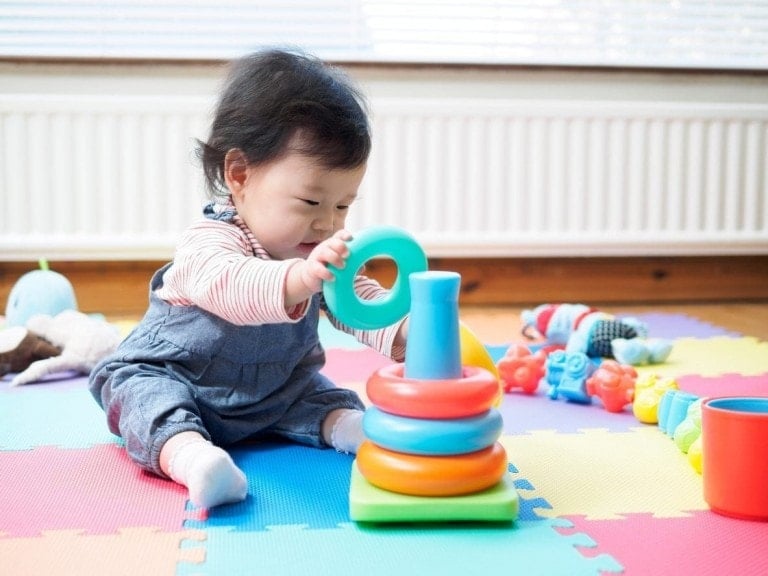Some women are just blessed that their babies sleep through the night from day one. Then there are others whose baby hasn’t slept longer than an hour at a time from day one. Instead of assuming it has to do with who got lucky in the sleeping baby lottery, I decided for myself that if I could help control my outcome, I was going to. There were lots of things I tried that failed, but what I found out more obviously was this:
We have a lot more control over our baby’s sleep patterns than we think. We may be unknowingly preventing our babies from sleeping through the night!
1. Confusing Baby’s Day and Night
Getting your newborn on a day-and-night cycle is imperative to getting them to sleep through the night. In the first weeks of life, the baby sleeps so much that it’s hard to get the routine started, but here are a few tricks.
Keeping the house dim and quiet all day and all night confuses the baby. From the first day home, I always made sure that the blinds were open when it was daytime. I am not careful about making noise (if you have other children, this will be easy!).. and I interact a lot with them, especially in the few precious moments their eyes actually open.
When the night starts to fall, we begin to wind down. I dim the lights, and I make sure the house gets quieter with no extra stimulation. When it is bedtime, I lay them down in their crib with the same bedtime routine every night. If they are still in the phase of NEEDING to eat in the night, I feed them in the dark. There’s no talking, no eye contact, and I lay them directly back down. Getting them aroused with lights, TV noise, and talking will stimulate them into wakefulness. I know it is hard! You may be a night owl and want to hold and rock them all night, but there will be plenty of time for that the next day. Both you and baby need rest!
2. Having Inconsistent Sleep Times
Having a consistent bedtime is the first priority, then consistent nap times. My bedtime with my first was a lot more liberal than my bedtime with my second. With my first, we were a lot more social and out and about. With two little ones, we tended to be homebodies a little more, trying to juggle two kids under two. And we were ready for bedtime when it rolled around! Look at your typical weekly schedule and decide when the baby has to be up in the morning. Then go 12 hours prior and make that the bedtime. Babies are fully capable of sleeping 12 hours, so I always did 8 pm-8 am as sleeping through the night. It didn’t take my boys long to get there. Have hope, mama!
Naptimes need to be somewhat consistent as well.
3. Not Increasing Food Intake During the Day
Babies only NEED to eat every few hours over 24 hours for just a short time (until they’ve reached and surpassed their birth weight and are at least 11 lbs). If they are still waking after that phase has passed, it could be because they have fallen into a habit of eating at night. To prevent this, make sure that they are meeting their dietary needs throughout the day. I found once we started cereal in the evening, I knew they could go longer at night, and I didn’t jump up to feed them right away. I would try their pacifier or letting them self soothe for a few moments before beginning a nighttime feeding.
4. Not Allowing Time for Baby to Self Soothe
Somewhere between our parents’ generation and our generation, the term “self-soothe” has become a swear word. But jumping up to every whimper will create bad habits, and we will be slaves to their cries for a lot longer than necessary. It is okay to let your baby cry for a few moments while waiting to see if they will settle on their own. Babies will often cry in their sleep. When we automatically assume they need to be fed or changed, it wakes them when they may just go back to sleep after a minute or two.
A great way to get your feet wet with this idea is to have them self-soothe at nap time. During that time, you are fully awake and can concentrate on how long you are letting them cry. I always set my microwave timer for 10 minutes at a time, and, oh my word, 2 minutes feels like an eternity when they are crying. But they almost always settled themselves by minute 10, and eventually, they didn’t cry at all when I laid them down.
5. Providing an Inconsistent Sleeping Environment
Just like I don’t sleep very well away from my own bed and the comfort of my own home, I found my babies always slept better when they were in their own comfortable space at bedtime. Co-sleeping or independent sleeping, keeping things somewhat similar every bedtime, will help baby recognize it is time to sleep.
Babies and sleep seem like an oxymoron for a lot of people. More often than not, parents have to put the work in to get their babies to have healthy sleep habits. It is possible, and the more work you put in earlier, the better success you will have later on. Stay consistent and watch what happens!
As always, these tips will only work if you have already sought professional advice to ensure that your baby isn’t struggling with a more serious medical condition.


































